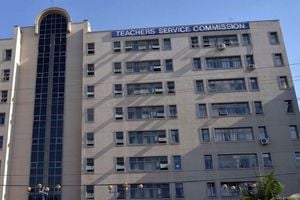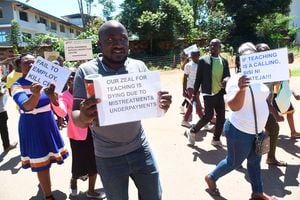
Lodwar Mixed Comprehensive and Integrated School gate on May 28, 2024.
Jacob Ekite, 17, a Grade Eight learner at AIC Lokichoggio Mixed Primary and Junior Secondary School wakes up at 5:30 am every day to prepare for the 45-minute walk to school.
Being an orphan, he is hosted by his guardian Ang'olo Ereng, in a manyatta near Lopiding Sub-county Hospital.
"I can't recall the last time I had breakfast there because my guardian is poor. My focus is to complete my education and change my life, support my siblings who are herders at Nanam village and my guardian who begs for food or sometimes gets lucky to be enlisted in the relief food programme," he says.
He leaves the manyatta at exactly 6.00 am with the hope that he will get food at school at mid-day through the school feeding programme.
On Thursday, he arrived at exactly 6:45am, and read his books before a mathematics teacher went into the class of 65 learners at 7:30am.
By 8:10am, the teacher was through and left them with homework that Ekite did immediately. No other teacher taught them for the rest of the day.
"There is no serious teaching going on even if we go to class. There is no timetable. We only have one teacher for both Grades Seven and Eight will teach us. The other two intern teachers are yet to report to school," he said.
School music team practise
"Those of us who are part of the school music team practise until the teacher signals us back to class or until lunchtime. This helps me to be active and forget my situation," Ekite said.
He is among JSS learners who have been left to study on their own in most schools in the North Rift region after JSS teachers downed tools demanding permanent employment.
In West Pokot County, most learners who spoke to the Nation said they go to school to read on their own and they fear this will affect the syllabus coverage.
"My daughter told me that they only go to school idle because JSS teachers are not in school," a parent who sought anonymity told Nation.
A survey in Pokot Central and North sub-counties on Thursday established that only a section of JSS teachers are in school.
"I am the school head teacher and also the JSS teacher. There are only two of us in the school. Most JSS teachers in the North Pokot sub-county are teaching because we didn't participate in the protests," said a teacher who asked not to be identified fearing being victimised.
He said they received a circular from the Ministry of Education to forward names of JSS teachers not in school. Another teacher from Kipkomo sub-county said that she has not reported to school.
"I just sit in my house because the government has failed to honour us,” she said.
Derrick Owino, a pupil at Mahola Junior School in Siaya County, is all smiles after receiving news that he will go back to class after three weeks of absence.
Occasionally, he says, teachers from the primary school section attend to them but only briefly since they have other classes to attend to.
“When we get to school in the morning, after cleaning we sit and wait for any teacher who will come in. If none comes, we read last term’s notes,” he said.
Their library does not have adequate books which makes it difficult for them to study by themselves.
“I am in Grade Seven and besides the class readers, there is nothing for us to read,” he lamented.
A senior teacher from Siaya County who spoke to Nation said the strike has done a great disservice to the learners owing to the nature of the CBC curriculum.
“The schools are understaffed and the workload is heavy on the JSS teachers. The TSC needs to urgently find a return to work formulae because the learners have already lost so much which may not be recovered,” said the teacher.
For Shaun Byron, a learner in Grade Seven, the routine is to wake up at 6.00 am every day of the week. His school, Shauri Yako Primary School in Homa Bay town, is five minutes away.
Remedial classes
"We normally have remedial classes for one hour before normal lessons begin at 9.00 am. Teachers have fixed lessons during remedial where we revise some of the topics we have covered," the pupil said.
According to the learner, none of his teachers has ever missed attending a lesson this term.
This is despite JSS teachers in other counties holding protests. Shauri Yako Primary School Headteacher John Oguttu said the strike has not affected lessons at the learning institution.
"All our teachers are always present in school," he said.
Dennis Mogaka, a Grade Seven pupil at Nyanguru Primary School in Kisii County, says they have had more time playing than learning ever since JSS teachers went on strike at the beginning of the term.
"In most cases, we are not taught all the lessons as it should be. We have two JSS teachers but since the strike began they have not been coming to class regularly. We have not covered much, in fact, there are certain subjects that we have not touched ever since we reopened," the student said.
"Of the two JSS teachers that we have, only one has been coming to class occasionally. She takes us through morning lessons but in the evening, we are asked to do group discussions,” he added.
According to the learner, the other teacher has never set foot in class since the second day of the term.
"He only came when we reopened and told us that we will meet when the government addresses their grievances. He told us that it was not his wish not to come to class,” the learner added.
Just like the rest of the country, JSS teachers in Kisii County have been holding peaceful protests every week.
Reporting by Sammy Lutta, Oscat Kakai, Kassim Adinasi, Wycliffe Nyaberi and George Odiwuor







